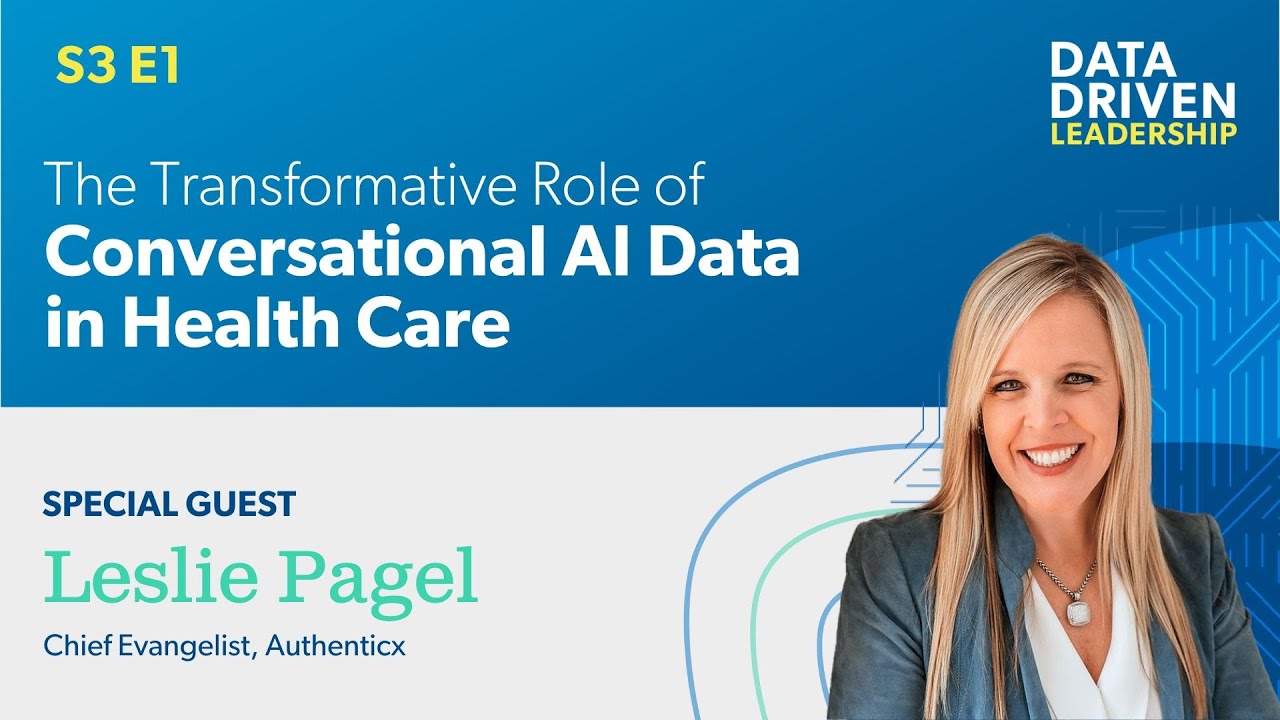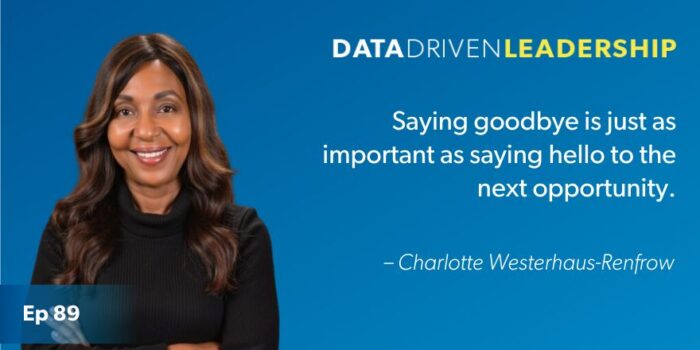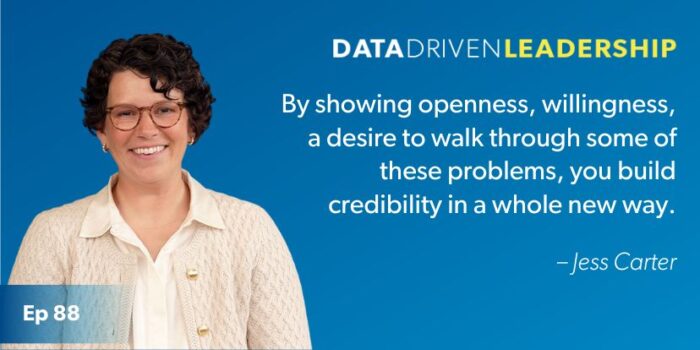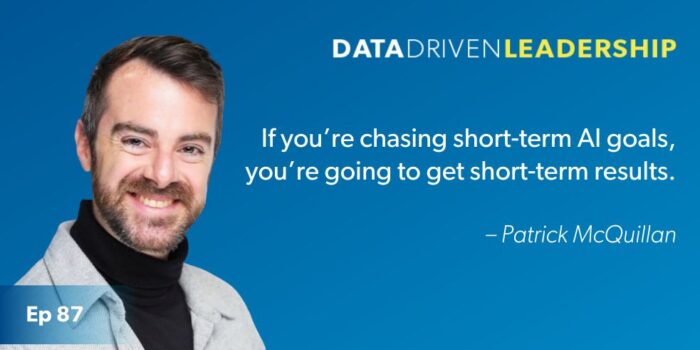
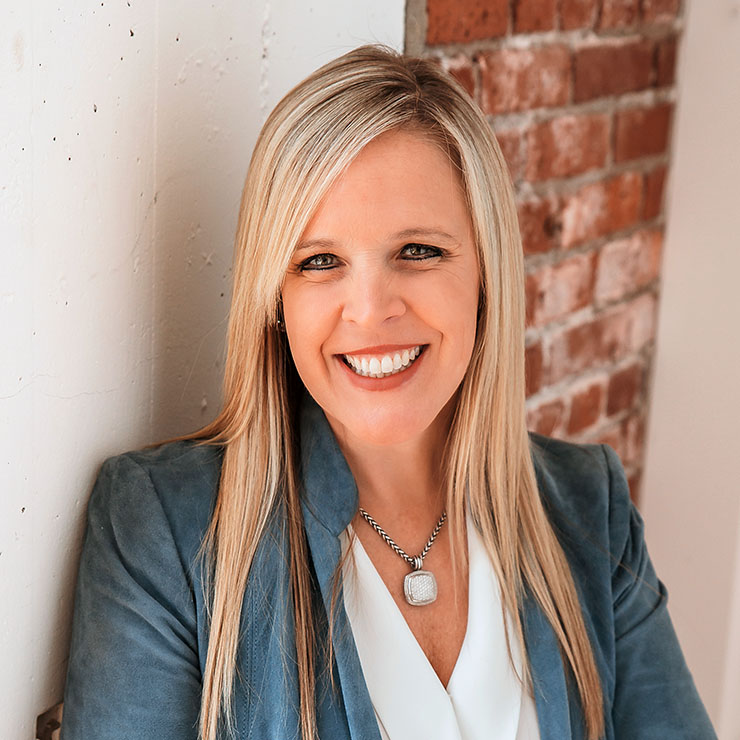
Transcript
Jess Carter: The power of data is undeniable and unharnessed. It's nothing but chaos.
Speaker 2: The amount of data, it was crazy.
Speaker 3: Can I trust it?
Speaker 4: You will waste money.
Speaker 5: Held together with duct tape.
Speaker 6: Doomed to failure.
Jess Carter: This season, we're solving problems in real time to reveal the art of the possible. Making data your ally. Using it to lead with confidence and clarity, helping communities and people thrive. This is Data Driven Leadership, a show by Resultant.
Welcome back to Data Driven Leadership. I'm your host, Jess Carter. You are about to listen to Leslie Pagel talk through her story and how she's leveraging conversational AI to improve the healthcare world, especially in the United States.
I’m really moved by this because you can imagine most of us have had a situation where we're in a hospital or a medical facility and wish we weren't. And I think about when I've been there, some of the conversations and the experiences I had and wished that they weren't what they were. And they're usually, you know, these are pretty intense moments for you or your loved ones. And so where I get really excited is Leslie has spent her career in client experience, and she's really helped harness and define client data and how to leverage that as an asset in companies for her whole career. So, she's just a master at it. Then she steps into this career, move to orthodontics, and she's now, you know, helping them with healthcare-related conversational AI—like, what a perfect fit. And I've never really thought about or hadn't thought much about how do you make sure that your client or your patient, in this case, that their voice is heard in your strategy sessions? And when you're talking about your strategic plan for next year, your budget, whatever. Until this year, until I started really representing that voice at large here at Resultant, it is so neat to hear the passion with which she shares and the insights and learnings that she kind of walks companies through as they're on this journey.
So I think this is such a cool episode to understand more about how to take conversational data that your your company is having usually with, you know, your employees and your end users, whether that's a patient in her case or a client in mine, and using that conversational data and treating it like it's an asset to your business. I hope you guys enjoy.
Leslie, welcome.
Leslie Pagel: Thank you, Jess, for having me. I'm really excited to be a part of this conversation and looking forward to what we have to talk about.
Jess Carter: Me, too. Well, let me start with this because I don't know if I'm the only person, but chief evangelist is a cool title. Can you explain? What does that mean?
Leslie Pagel: So, by definition, an evangelist is an enthusiastic advocate. But what that means in my world is I get to spend my time out there opening up the eyes to, we work within the healthcare industry, so opening up the eyes of healthcare leaders to a more efficient and effective method for keeping their finger on the pulse of their customers. And that method is conversational AI, which is new to the market. And it's an opportunity that healthcare leaders don't really know that exists. So I spend a lot of my time educating and making them aware of this technology that is more efficient and effective and helping them really listen to the voices of their customers and get additional context and clarity that their current methods, which are largely survey data, are delivering to them today.
Jess Carter: Yeah. Well, and so you said conversational AI. What is that? For those who don't know, what is that?
Leslie Pagel: So great question, because if you Googled “conversational AI,” chances are top hits would be AI that is looking to replace or assist humans in a conversation. And that is not at all what we do. We are conversational AI in terms of a listening company. We help companies leverage their conversations, whether it's with the human being or with the bot, and mine it for rich contextual insights that any part of the business can use to really help customers lead the way in their decision-making. So, it's more from a listening perspective as opposed to an AI that is facilitating that conversation.
Jess Carter: Okay, so a lot of people who listen are kind of data enthusiasts, so they're maybe used to more structured data. It sounds like this is sort of unstructured data. So is that, am I right there?
Leslie Pagel: Well, conversations, yes, by nature, are unstructured. We speak, on average, 125 to 150 words a minute. And so you turn that into a customer conversation through a contact center or through an ordering system. Creates a lot of unstructured, messy data.
Jess Carter: Well, and so you guys at Authenticx, your focus is health care, right? So you're doing this in the healthcare space. And then one of my questions is, you know, do you have any stories around how this has what kind of outcomes using your conversational data in a meaningful way have generated? What's different now because people are doing that?
Leslie Pagel: Yeah, well, let me clarify one point because conversations are unstructured data. Conversational AI takes that data and gives its structure. It gives its meaning, which allows us to quantify trend into it and explore it as well. But some examples, you know, one of the things that I find fascinating in the world of studying conversations is, there are multiple perspectives that can be gained. So, for example, when we listen to the customer side of the conversation and what they have to share, they share a wealth of information about the product, about the service, and about digital. And so that part of the conversation really informs a lot of marketing strategy, product strategy.
One example there that I could share is a large firm, a manufacturer, just had a brand new product launch in the market. And in any industry, a product launch is a big deal. But in health care, it's a huge deal because there's years of R&D, clinical trials, approvals, marketing, branding, building out the distribution channel. It's a huge deal. And so this company really wanted to make sure they had their finger on the pulse of the customer experience day one of product launch. So they started listening day one, and what they found is that this particular product requires some diagnostic testing to be done before the treatment plan. And they found that their patients were getting stuck in a diagnostic phase because they didn't understand how to navigate the costs and coverage of the diagnostics. They were very clear on what was covered and what wasn't with the treatment, but not the diagnostics so quickly. Weeks within product launch, they were starting to react in a very agile way that helped their customers get out of a place where they were getting stuck, be quicker to get on the treatment that they were looking to get on.
Jess Carter: How cool.
Leslie Pagel: Yes. So that's just one that's just one perspective, Jess. So then you've got the other side of this conversation. That's usually your employees, your frontline staff that are answering calls, answering questions from customers. And when you listen to them, you get to hear the experience that you create for your customers, and you get to hear where your front line is getting tripped up in supporting the customers where they need support. So there's, you know, all kinds of examples on that end, where companies are listening really closely using conversational AI to the agent and saying, hey, we're not doing a good job of proactively listening here. We're asking customers to repeat themselves, and so they can start using conversational AI as a coaching tool for their agents and to reinforce positive experiences that they're delivering as well.
Jess Carter: Okay. So you can even use it to improve your product or your service, but also to understand or appreciate if the experience the customer or client is having is consistent or if you can help others coach or train so that it is more consistent. Is that right?
Leslie Pagel: Exactly. Yes.
Jess Carter: That sounds pretty cool. I'm also imagining—you can tell me if I'm wrong—that there is a volume factor here, that the number of learnings or conversations you can have using conversational AI is far more robust and broad. You're having more feedback cycles through this than you would have if you were doing this manually in any way. Is that fair?
Leslie Pagel: Absolutely. Well, you think about kind of the magnitude, and every company is different. Some companies, we get 10,000 conversations a month. Others it's over a million. So there's a lot of variation there based on company size. And the beauty, though, is that 100% of your conversations, 100% are being analyzed by artificial intelligence. They're being listened to by artificial intelligence and machine learning models, which is pretty incredible.You know, when you think about human capacity and kind of where AI serves a benefit, humans don't have the capacity to listen to all that. But, artificial intelligence allows us to listen to the voice of our customers. Yeah, all of them.
Jess Carter: Yeah. That's amazing. Well, did you tell me was it like, so there was some metric you told me about, like 200,000 conversations or something? What was that?
Leslie Pagel: This year, we are on track to analyze over 200 million healthcare conversations.
Jess Carter: That's so cool!
Leslie Pagel: And it's across all industries, pharmaceutical manufacturers, healthcare providers, hospital systems, payers, your health insurance plans. And it's, you know, it's I've got to like, kind of pinch myself sometimes because working with any one of these companies is heartfelt, right? But being able to have this lens into the healthcare industry that we have, you see the web of complexity that we've created for the industry as well. Then you see some, you know, pockets of goodness as well. But we have this bird's-eye view into an industry that is crushingly complex.
Jess Carter: Yeah, well, and okay, let me ask you this because I imagine most people have talked to their doctor this year or helped a loved one who needed help in primary care. Like, it's very easy to imagine a scenario where I was in a hospital in the last two years, having a child or helping someone who was sick.
This feels substantive. Where the concept of, if we can look—I have a, my aunt is like a nurse practitioner. She's actually been a professor of nursing research. And I've always had a really impressive sense of honor for the work she did that it wasn't just about nursing. It was how do we nurse better, more effectively, and innately in that research, she was listening, right? She was testing her theories, and she was running research studies. And there was sort of this sense of, does everyone do that? Like, do the people who run the hospital do that? And the people, the doctors do that, and the nurses do that, and the frontline staff? Like, is everyone listening well? Because it feels like often that might not be the case. And it seems like this is something that everyone could leverage in the system to improve all of those areas of the system. Is that right?
Leslie Pagel: Absolutely.
Jess Carter: Cool.
Leslie Pagel: It's an enterprise business intelligence tool, really. And you know, you mentioned physicians. We have been in front of 90 physicians where they are listening to the voice of their customers in a way that they've never kind of consumed before. And since this is Data Driven Leadership, it's all data-backed. You know, it's all about the data that is surfacing in their conversations. And then, we bring that data to life by having them listen to the authentic voices of their customers and how they talk about the data point that we're sharing with them.
Jess Carter: Is that when you talk about data-backed storytelling, is that data-backed storytelling?
Leslie Pagel: Data-backed storytelling, yes. This really the marry-ment of quantitative data with qualitative stories or macro insight with micro-moments or speaking to the head with data in heart with examples of it. Yes.
Jess Carter: Wow. Okay. So, that is so neat because, I do think that must be a key component to, if you're going to run an implementation on conversational AI, if you're going to take on a new hospital as a client, you have to do it, I imagine with data-backed storytelling or else they're seeing metrics that they've probably already seen on a dashboard somewhere, but they don't understand how to generate insights or meaning behind it. Is that right?
Leslie Pagel: I would say that chances are they're seeing data they've never seen before. So, that's new. Now, they might be seeing data that has been anecdotal before, like, oh, yeah, we hear this from our front line, you know, and now they're seeing it as quantitative data. And so that would be new as a new data source. Okay. Now, I'll tell you, though, the best way to activate that data is with data-backed storytelling. And it's because, as human beings, we are driven to act by our emotional selves. We're not rational beings. We are very irrational. It's because our emotions drive our behaviors, and data-backed storytelling allows us to take that emotion that our customers are feeling and translate that, so the audience feels it.
Jess Carter: Is it like forced empathy?
Leslie Pagel: Jess, I'm telling you, I have been in meetings where eyes are opened: “But I have never heard my customer data in the way that I'm hearing it. Leslie, you have my full, undivided attention.”
Jess Carter: Wow.
Leslie Pagel: “What are we doing to support our front line in hearing and managing this heavy conversation?” So it's like immediately going into, “We've got to do something to fix this problem.”
Jess Carter: How cool. Well, and so when you talk about data-backed storytelling, I had not heard that phrase before. Is that something that you've sort of conjured up and you're sort of teaching people inside of Authenticx, or is this a thing that's like known, and I should be more aware of it?
Leslie Pagel: You know what? That's a good question. I don't hear it, either. You know, you hear about storytelling, you hear variations of storytelling. I was probably introduced to the language of data-backed storytelling when I joined Authenticx, two years ago. But I'll tell you, it is our very intentional approach at bringing the head and heart together. You know, a lot of times, people think about storytelling in these buckets of presentation, like just the delivery, or they think of it as data visualization. And for us, it really is about the data being data-backed, evidence-based insights that are communicated in a storytelling format for purposes of inciting action within the business.
Jess Carter: That's awesome. This conversation reminds me of—you are allowed to laugh at me. Did you ever watch the TV show House?
Leslie Pagel: Yes! Okay, Oh my gosh.
Jess Carter: It totally reminds me of that. Where it's like he was just so good at like, not just listening, but like, investigating and figuring it out. And it's almost like this avenue of, you know, you couldn't scale that guy, but can you scale the ability to listen in more effective ways that generates, hopefully, better outcomes in the healthcare industry that there are, the whole point, right, is that there is better treatment and care of patients, right?
Leslie Pagel: Absolutely.
Jess Carter: That's awesome. Very cool.
Leslie Pagel: I love that kind of visually. But in my head.
Jess Carter: It is, you know, I would say he could use some forced empathy on the show, but it is still an investigative, you know, masterclass. And how do you pay attention to the details with a client or a patient and not miss something important? How do you discern what is and what isn't important? And what's neat about what you guys are doing with conversational AI is you're valuing that data asset when we haven't yet in the past, or at least not at scale. And the ability to say this is an asset for a healthcare facility or a company, and how do we leverage that asset more meaningfully, I think it's fantastic. It's awesome.
Leslie Pagel: Yeah, we talk about it as a renewable source insight. And when you think about what that means, renewable, it means it's not depleted when it's used. And historically, we've been throwing our customer voice into the trials. You know, it's not being recycled or renewed. But today, through AI and technology, we have the opportunity to harness every voice, every human who's interacting, including our own team that's on the front line.
Jess Carter: Well, that's equity, too. I think it's something else. You've mentioned in a conversation with me of, hey, this means that every voice is heard, and that means every layer and type of diversity can be at play, and there's a voice to be had here. It's not in anecdotal anymore. And that seems really important, too.
Leslie Pagel: Absolutely.
Jess Carter: One curious question I have, and you know, you have permission to say not yet, but one of the things I imagine I'm just making this up here is if you were to work with me and I ran some hospital group over time, can you look back and see how our conversations have evolved and how themes of conversations have improved or not?
Leslie Pagel: Yes, absolutely. I mean, there's definitely a trending element to it. You know, that would be kind of in this category of “finger on the pulse.” You know, making sure our agents are delivering a good, consistent experience. We have a machine learning model called the Eddy Effect, and it detects friction in a conversation when a customer's stuck in their journey. And that's like “finger on the pulse.” They're going to track that over time and see how that's changing. But there's also the ability to see when new types of interactions are emerging and the company in the front lines like, you know, we've we don't know how to respond to this where they can have their finger on the pulse of that change as it's happening to their business.
Jess Carter: That's so cool. Well, okay, so you talk to me about doing, kind of applying conversational AI to health care. If a healthcare practitioner happens to be listening and they just want to know, like step one, like where do I, how do I get started? What does this journey look like for me? What advice would you give someone who’s not here yet, wants to get there?
Leslie Pagel: I would recommend by finding the person in your organization that has stored conversations. They're stored. Most likely, they're stored in the organization. And so finding it's the contact center or, you know, the nurse triage frontline group or scheduling. Go there and ask them if you can listen to ten calls, they should be able to set you up and just listen to ten. And while you're listening to the ten calls, be thinking about what am I hearing from the customer? What am I hearing from our side of it? What's the interplay, the exchange between the two? And as you do that and imagine it on scale, you know, because you're going to start to hear things like why they're calling, you know, or what their emotion is. And imagine being able to quantify data-backed, data-driven leadership. So, being able to do that at scale. And the third thing is, just get curious. I would ask a lot of questions within your business around what types of conversations are stored, where are they stored, how are we using that data? You know, a lot of it's used just to facilitate the call, like we're going to drop average handle time or we're going to drive improvement in first contact resolution. It's about kind of using the data, but ask, is there any other use of this data that we're doing today?
And if not, I would start asking what about the possibility of that. Yeah. And then I'd get curious about AI as well. There's a lot of hype right now around AI, and it's confusing. And I would, you know, I would just get curious about AI and AI is built—there's two things that make up AI. You've got your algorithms, and everyone has the same algorithms. What's unique is the training data; it's the data that the artificial intelligence is built on, and that's unique, and that's different. So I'd get really curious about the training data that's being used as well.
Jess Carter: I appreciate you saying that because I think a lot of people who haven't worked with AI. So when we say training data, we're talking about the data that an entity has in order to train their AI to be as effective as possible. So, every company has different access to data to sharpen their AI to make it more and more effective. That's what you're talking about. Yes. So you're right. Like when we talk about, you know, I was looking up the other day, some AI tools around knowledge management, and it's just crazy to me that it's like there's so many places that say that they do this and they do it well and they use AI and it's like, but the efficacy of your AI does depend on the quality in which it was developed and the training data, etc. I like that you're kind of saying, hey, go listen, like, listen to those voices and then be curious about the technology and how you might be able to bring both to bear for what your company needs. What are you, what problems are you trying to solve, and how do we use some of this to get there?
Leslie Pagel: Yeah.
Jess Carter: I think for me one of the things that I appreciate so much about you like, you've been a voice in my head. You've kind of been this forcing function and, you know, on LinkedIn and things of how to advocate for the patient, how to advocate for my client, how to make sure that when we're doing, you know, when I think about Data Driven Leadership, when we're building a strategy for 2024, we're looking at our budget. Is the client or the patient's voice in that conversation? And if not, is there data we could use to bring it to the conversation? And so I think some people have like, client advisory boards or some people have, you know, other solutions. But I think it's really important to make sure that we're contemplating the growth of a hospital or the growth of a primary care facility or, in my case, a, you know, a consulting company. But we're doing that through the lens of what the clients or patients need, what do they want, what should improve next year? And do we advocate for their voices, especially in healthcare? It's like my hand goes to my heart. Right? Especially in health care, we have to consider what a patient wants and needs. The whole point is that they have agency over their well-being and that they get to voice what they can when they can. So it just seems like it couldn't couldn't be more important.
Leslie Pagel: Absolutely. One of the things that I talk about is what's out of sight is out of mind. You know, I'm a mom of two, and I learned that when they were babies, it's like, oh, I can get them to stop crying if I take their toy and hide it. And, you know, the thing is, it's like the last thing that we want is to keep our customers out of sight because when they are, they're out of mind, and we do it. It's unconscious, but we do it all the time in business, you know, and it's because our customers don't always have a physical presence or they don't always have a space in which we make them physically or kind of, you know, conceptually, physically, available. And the data is a place to do that where it's like, here's a place where we can give our customers a presence in our business and keep them top of mind.
Jess Carter: Absolutely, man, I love it. I think you have just breezed through all of my questions. Is there anything we haven't covered that we should?
Leslie Pagel: I, if it's okay. I would love to do just a little plug for a storytelling experience that we're called Crushing Complexity. I mentioned earlier. That we have this bird's-eye view of the healthcare industry, and we feel like the part of our responsibility to use our perspective to help the healthcare industry. And so we've created a storytelling performance called Crushing Complexity, and we're using it really as a conversation starter within the healthcare industry to bring people together to start with a data-backed storytelling that looks at the healthcare landscape from several different perspectives and then go into conversation, bring the entities together and talk about what are some of the things that we can do to collaborate across verticals? What are some of the things we can do in our business? So, if that's something of interest to your audience, more information on the Authenticx website. But you got me talking about our bird's-eye view. And I thought, you know what? I should just share this.
Jess Carter: That's awesome. I'm so glad that you do well. And I do have to cover this. If people want to follow you, Leslie, where can they go to continue to, you know, continue the conversation?
Leslie Pagel: Absolutely. So, LinkedIn's the best place to connect with me individually. Authenticx.com. It's the word authentic with an X at the end. Authenticx is a wealth of resource about conversational AI. We also have a monthly newsletter called The Pulse. If you're interested in keeping on top of the industry of conversational AI and what's happening at Authenticx, so you can subscribe to that as well.
Jess Carter: Awesome. Leslie, thank you so much for joining us today.
Leslie Pagel: Thank you so much for having me.
Jess Carter: Thank you for listening. I'm your host, Jess Carter. And don't forget to follow Data Driven Leadership wherever you get your podcasts. Great. And review, letting us know how these data topics are transforming your business. We can't wait for you to join us in the next episode.
Insights delivered to your inbox


